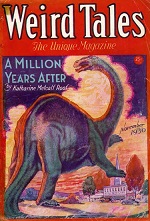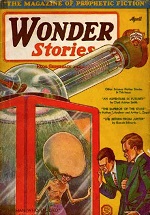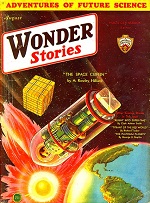Short Story
Clark Ashton Smith
writer
- Filter: Show all works, including those with no time phenomena.
- Found: 5 results in 4.13ms
Short Story
The Uncharted Isle
- by Clark Ashton Smith
- in Weird Tales, November 1930
A man, adrift in the Pacific, washes up on an island where none of the men (or the giant ape) see or interact with him, which leads him to conclude that part of him is in the bygone past.
Is there a part of the Pacific that extends beyond time and space—an oceanic limbo into which, by some unknowable cataclysm, that island passed in a bygone period, even as Lemuria sank beneath the wave? And if so, by what abrogation of dimensional laws was I enabled to reach the island and depart from it?

Short Story
An Adventure in Futurity
- by Clark Ashton Smith
- in Wonder Stories, April 1931
Conrad Elkins, a scientist from AD 15,000 who hopes to find a solution to the problem of too many male babies in his time, strikes up a friendship with Hugh in present-day New York City, eventually inviting Hugh to return with him to a future of infinite leisure where Venusian slaves with Martian overseers outnumber humans five-to-one.
And do you ever think that present-day New York will some time be as fragmentary and fabulous as Troy or Zimbabwe? That archaeologists may delve in its ruins, beneath the sevenfold increment of later cities, and find a few rusting mechanisms of disputed use, and potteries of doubtful date, and inscriptions which no one can decipher?

Short Story
Short Story
Flight into Super-Time
- by Clark Ashton Smith
- in Wonder Stories, August 1932
Eccentric millionaire Domitian Malgraff and his Chinese servant Li Wong head off in a time machine, first to adventure into the future, but if that fails to hold there interest—says Malgraff in a letter to his ex-fiancée—there is always the past.
You have always considered me a hopeless dreamer; and I am the last person who would endeavor or even wish to dispute your summary. It might be added that I am one of those dreamers who have not been able to content themselves with dreams. Such persons, as a rule, are unfortunate and unhappy, since few of them are capable of realizing, or even approximating, their visionary conceptions.




